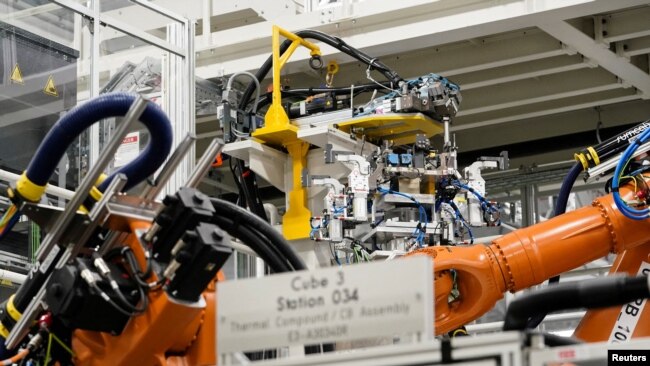電池価格高騰でも伸びるEV販売台数
コロナによる旅行自粛ムード解消による購買力増加は容易に想像がつきますが、投資家、特に若い投資の価値判断を、高く評価します!!
”売れる間は、SUVガソリン車でも売りまくる” なんて安易な売上至上主義のメーカーは淘汰されるということです。そんな時代ではありません。市場マインドの読み違いは企業にとっては致命的結果をもたらしますが、私たちそして、地球環境には最適化されるということです。
さぁ、今日もVOAで英語を学びましょう!!
電池価格高騰でも電気自動車販売台数は増加(和訳)
Electric Vehicle Sales Increase Even with High Battery Prices
April 25,2022
今年は、価格が上昇しても、世界中の人々が電気自動車を購入するために列をなしています。
リチウムイオン電池の平均価格が昨年の105ドルから第1四半期には推定160ドルに上昇しても、電気自動車(EV)の需要は堅調に推移しています。コストの上昇は、供給問題、ロシアの金属に対する制裁、投資家の投機が原因です。
中国で最も売れているEV、Hongguang Miniのような小型車では、バッテリーコストの上昇により約1500ドル、表示価格の30%に相当する金額が上乗せされています。
しかし、ロシアがウクライナに侵攻して以来、ガソリンやディーゼル燃料のコストも上昇しており、専門家は、環境への配慮もEVを選ぶ購入者を増やしていると指摘します。
テスラからHongguang Miniを製造するSAIC-GM-Wulingまで、メーカーはEVの値上げでコスト上昇を消費者に転嫁しています。
今後、さらに増えるかもしれません。スロバキアのEV用バッテリーメーカー、イノバットのアンディ・パルマー会長は、”コストの上昇は自動車メーカーに転嫁されなければならないだろう”と述べています。
しかし、EVの購買意欲は今のところ衰えていません。ウェブサイトEV-volumes.comによると、第1四半期の世界のEV販売台数は120%近くも急増したと言います。
ヴェンカット・スリニバサン氏は、シカゴにある米国政府のアルゴンヌ国立研究所でエネルギー貯蔵科学共同研究センターのディレクターを務めています。同氏は、”さらに多くの人々が””電池と車両のコストにかかわらず "EVを購入するだろうと述べています。
今回の電池コストの上昇は、技術の向上と生産の拡大が30年近くコストを押し下げてきた状況において、異例の短期的な変化かもしれません。業界のデータによると、2021年の11ロワット時あたり平均コスト105ドルは、1991年の7500ドル超から99%近く低下しています。
専門家は、バッテリーのコストは今後1年ほどは高止まりするかもしれませんが、その後、自動車メーカーやサプライヤーによる大規模な投資によって、不足から余剰へとバランスが変化し、再び大きく下落する可能性があると言います。
「これはバブルのようなもので、そのバブルが落ち着くのは少なくとも2023年末になるだろう。」とLG Chemの元幹部、プラバカル・パティル氏は述べています。
業界では、EVが化石燃料車と同等のコストに到達するシグナルとして、バッテリーセルのコストが1キロワット時あたり100ドルになることを長い間待ち望んでいました。しかし、ガソリン価格が高騰し、消費者の嗜好が変化している今、そうしたコストへの配慮はもはや重要でなくなるかもしれない、と専門家は指摘します。
リチウムイオン電池の共同発明者で、2019年のノーベル賞受賞者であるスタン・ウィッティンガム氏は、中国をはじめとする市場のEV需要は”人々が考えていたよりも速く、EV用電池の材料供給よりも速く増加している”と言います。
環境と気候への懸念も、購入者、特に若い人たちが化石燃料を燃やすものよりもEVを選ぶきっかけになっていると、ハリファックスに拠点を置くバッテリー材料サプライヤー、ノボニックスのチーフエグゼクティブ、クリス・バーンズ氏は言います。
「市場に参入してくる若い人たちの多くは、単純な経済性を超えて、地球にとってより良いものだからEVに乗るのだと、購入の意思決定をしています。」とバーンズ氏は言います。彼らは、”ガソリン車に乗った方が安いのに”そのような決断をしているのです。
Electric Vehicle Sales Increase Even with High Battery Prices
Machines are seen on a battery tray assembly line during a tour at the opening of a Mercedes-Benz electric vehicle Battery Factory in Woodstock, Alabama, U.S., March 15, 2022. REUTERS/Elijah Nouvelage/File Photo
This year, people around the world are lining up to buy electric vehicles even as prices increase.
Electric vehicle, EV, demand has stayed strong even as the average cost of lithium-ion battery cells increased to an estimated $160 per kilowatt-hour in the first quarter from $105 last year. Costs rose due to supply issues, sanctions on Russian metals and investor speculation.
For a smaller vehicle like the Hongguang Mini, the best-selling EV in China, the higher battery costs added almost $1,500, equal to 30 percent of the listed price.
But gasoline and diesel fuel costs have also increased since Russia invaded Ukraine, and experts noted that environmental concerns also are pushing more buyers to choose EVs.
Manufacturers from Tesla to SAIC-GM-Wuling, which makes the Hongguang Mini, have passed higher costs on to consumers with price increases for EVs.
More may be coming. Andy Palmer, chairman of Slovak EV battery maker InoBat, said "rising costs will have to be passed onto carmakers."
But EV shoppers have so far not slowed down. Worldwide EV sales in the first quarter jumped nearly 120 percent, said the website EV-volumes.com.
Venkat Srinivasan is director of the Center for Collaborative Energy Storage Science at the U.S. government’s Argonne National Laboratory in Chicago. He said "more and more people" would buy EVs "notwithstanding the cost of the battery and the vehicle."
This increase in battery costs could be an unusual short-term change in a situation in which improving technology and growing production have pushed costs down for almost 30 years. Industry data showed that the $105 per kilowatt hour average cost in 2021 was down nearly 99 percent from over $7,500 in 1991.
Experts say battery costs could stay high for the next year or so, but then another large drop is likely as big investments by automakers and suppliers change the balance from shortage to surplus.
"It's like a bubble -- and for that bubble to settle down, it's going to be at least the end of 2023," said Prabhakar Patil, a former LG Chem executive.
The industry has long been awaiting the battery cell cost of $100 per kilowatt-hour, as a signal EVs were reaching a similar cost to fossil-fuel vehicles. But with gasoline prices high and consumer preferences changing, such cost considerations may no longer matter as much, experts say.
EV demand in China and other markets "is going up faster than people thought -- faster than the supply of materials" for EV batteries, said Stan Whittingham, a co-inventor of lithium-ion batteries and a 2019 Nobel laureate.
Concern about the environment and the climate also has led buyers, especially younger ones, to choose EVs over those that burn fossil fuels, said Chris Burns, chief executive of Novonix, a Halifax-based battery materials supplier.
“Many younger people entering the market are making buying decisions beyond simple economics and are saying they will only drive an EV because they are better for the planet,” Burns says. They are making such a decision “even though it would be cheaper" to drive a gas-powered car.
Words in This Story
speculation –n. assumption of a business risk in hopes of obtaining commensurate gain
notwithstanding – prep. in spite of
shortage –n. a situation in which demand is much higher than supply
surplus – n. a situation in which supply is much greater than demand
bubble – n. a state of booming economic activity
preference – n. a liking for one thing or alternative over another thing or alternative
